Ethiopia
Monday, February 22, 2010
- Lake Tana - added by Steve
Ethiopia has to be the world's largest
nation of beggars. Infamous for the hassle factor, it seems every
child is born with their hand out. The incessant requests for pen,
money, food, pen, money, food make travelling in this country tiring
at times. The colloquial way of getting someone's attention, when
translated into English, doesn't help; shouts of “YOU! YOU! YOU!”
when attempting to catch your attention, then followed by one of pen,
money or food, is a minor irritation that can quickly escalate to a
major player in whether you like Ethiopia or not! The begging is not
restricted to children either, it seems every man, woman and child is
more than happy to put their hand out and beg for anything as soon as
they see a faranji (foreigner).
Luckily for us we have become quite
accustomed to sticking out in a crowd, so are used to this attention.
Also seeing “YOU! YOU! YOU!” in the light that it is just the
English translation of their normal method of capturing anyone's
attention meant we were able to brush off a salutation which would
normally be quite rude in our culture! That said, by the time we left
Ethiopia, our patience was wearing quite thin. Anticipation of the
peace afforded travellers in Sudan, our next destination, filled our
thoughts and dreams!
Furthermore, Ethiopia is very densely
populated, and rather thin on the ground when it comes to organised
campsites, so attempting to bush camp becomes a trying experience, as
you are quickly surrounded by hundred of locals who incessantly make
requests for... yes, you got it, “pen, money, food”! Luckily,
when it becomes too much, we are able to escape inside Songololo, and
are able to cook dinner without being haunted by hungry looks and
begging eyes!
The incessant hassle aside, Ethiopia
was a fantastic experience with remarkable historic sites that we
thoroughly enjoyed. Our first stop after the Omo Valley was in Addis
Ababa, where we stayed with our wonderful new friends, Barny and Pip.
Pip works for DFID (The British Government's Department For
International Development), and they put us up in their palatial home
in Addis while we arranged our onward plans. Naturally bureaucracy
reared its ugly head when the Sudanese Embassy closed for a week
while the Sudanese president was in town for the African Union
Summit. One has to wonder why the visa section had to close while the
president was in the Hilton Hotel for the summit, but it is not our
place to ask these questions (or at least to expect answers!)
One good thing that came out of this
was our side journey to Wenchi Crater and Menagesha Forest,
undertaken to kill the time we had to wait for the embassy to reopen!
Wenchi Crater is a remarkably beautiful caldera with a lake inside,
the crater rim affords stunning views over the lake and it is
possible to take horse rides down into the crater itself and explore
the surroundings.
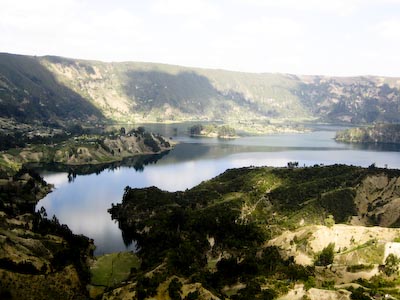
We came across a local water mill that looked like
it came straight out of the middle ages. A tiny canal had been dug
out the the mountainside and water redirected to a height sufficient
to operate the mill, remarkably ingenious. We were surprised to see
this, and it gave pause to wonder why no-one else in Africa that
we've seen has the wherewithal to build something like this?
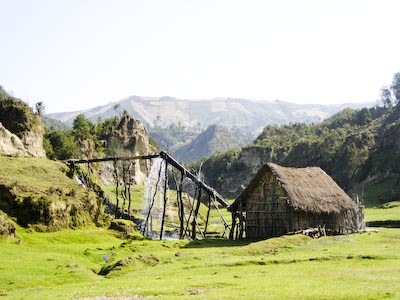
Finally our Sudanese visas were secured
and we were able to head off into the northern highlands. Our first
stop was Lalibela, a world heritage site because of it's famous
rock-hewn churches. These churches are incredible, literally cut out
of solid rock. When you consider that some are over 11m high and 33m
long, the feat is outstanding. It took them about 23 years to carve
the churches, 11 of them in total. It is a remarkable experience,
standing inside a church that years ago was solid rock. The fine
detailing in the carvings on the walls and the vaulted ceilings make
you boggle in amazement!
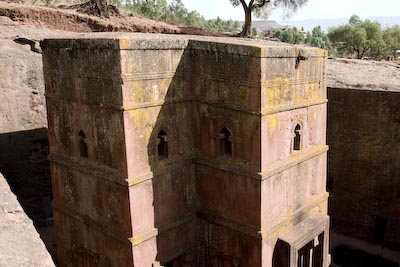
We drove further north, crossing
mountain pass after mountain pass. The mountains in the highlands of
Ethiopia seem to stretch on forever, a truly beautiful panorama from
the top of the world! The roads that cross these mountains are a
different story... Rox was clinging onto her seat for dear life as we
snaked our way up and down steep mountain tracks, with drop-offs of
hundreds of metres on the side. We crept along, well aware that if
Songololo's 10 tonnes got anywhere close to the edge we'd be meeting
our maker far sooner than we hoped!
Finally we made it to Aksum, which
local legend has was the home of Queen Sheba in the 10th
century BC. Whatever the truth is, a high civilisation rose here from
around 400BC, leaving behind magnificent stelae tomb markers that
still stand today. These columns are carved from a single block of
granite and erected who knows how, standing up to 25m high! Their
feat is made all the more poignant by the fact that UNESCO has yet to
re-erect a column stolen by the Italians in 1937 as they are unsure
how to achieve this without damaging the tombs beneath the stelae.
How the Aksumites did this more than 2000 years ago, and today, with
all our advances in technology, can't, gives one cause to wonder!
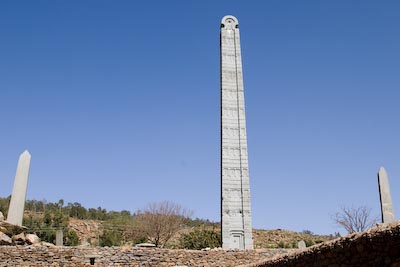
Returning south over many more crazy
mountain passes we made out way to Gonder, site of Ethiopia's
remarkable medieval city, with huge castles and palaces. Wondering
around the royal enclosure you feel like you're in the middle of
England, not Ethiopia! It is here that you get a real feel for
Ethiopia's remarkable history, and how important it was as a
crossroads for trade in bygone eras between Africa's interior and
Arabia and Europe.
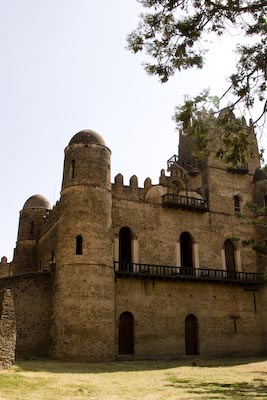
Something that is well worth a mention
is the local Ethiopian food, which we found delicious and a fantastic
culinary experience. Injera, the basis of their food, is a large
pancake like bread made from Tef, the local grain. Loads of different
foods made from various types of meat and vegetables, all spiced up
with berebere (local chilli), is then piled on top. You rip off
pieces of injera with your hands and use it to mop up the food and
sauce before shovelling it into your mouth. It's not the most
delicate of operations but is thoroughly enjoyable and extremely
tasty!
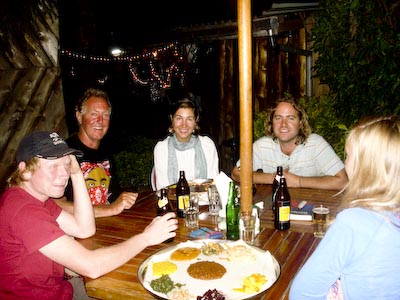
Our final stop before leaving Ethiopia
was a quiet recuperation period at the magnificent Tim & Kim
Village in Gorgora on the shores of Lake Tana. An island of serenity
in the ocean of chaos and hassle that is the rest of Ethiopia, it
makes a welcome break from the road. We spent a few days chilling out
on the lake's shores, swimming in the cool waters and once taking a
papyrus boat out to an island.
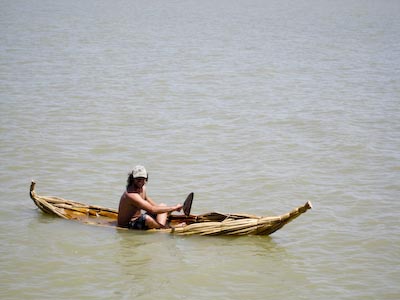
Mostly we just relaxed, relaxed and
relaxed, gearing up for Sudan and what now feels like the final leg
of our trip.